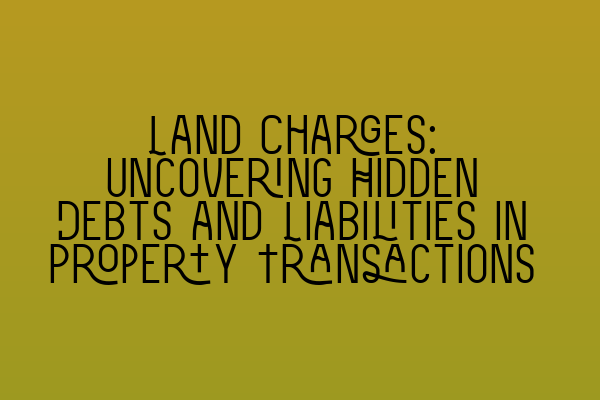Land Charges: Uncovering Hidden Debts and Liabilities in Property Transactions
Welcome to another informative blog post from SQE Property Law & Land Law, where we aim to provide you with comprehensive insights into the world of property transactions. In this post, we will be discussing the crucial topic of land charges and how they can impact property transactions. Whether you are a buyer, seller, or solicitor, understanding land charges is essential to ensure a smooth and secure property transaction.
What are Land Charges?
Land charges refer to certain debts and liabilities that are secured against a property. These charges are registered with the Land Charges Department and often go unnoticed during property transactions. Failing to uncover hidden land charges can lead to significant financial and legal implications for all parties involved. Therefore, it is essential to conduct thorough research and due diligence to discover any existing land charges on a property.
Land charges can be broadly categorized into two types: registered and unregistered charges.
Registered Land Charges
Registered land charges are those that are officially recorded and registered with the Land Charges Department. These charges are relatively easy to identify as they can be searched in the Land Charges Register or through title searches. Common examples of registered land charges include:
- Mortgages
- Legal charges
- Restrictive covenants
- Charges for unpaid Council Tax or business rates
If you are a solicitor or a property buyer, it is crucial to perform a thorough examination of the Land Charges Register to identify any existing registered land charges. Neglecting this step could potentially result in unexpected liabilities or debts that you may become responsible for.
For a more comprehensive understanding of property laws and key changes, we recommend reading our related article: Updates in UK Property Laws: Key Changes and Implications.
Unregistered Land Charges
Unregistered land charges are those that are not officially recorded with the Land Charges Department. They are often more challenging to uncover and require extensive research and investigation. Some common examples of unregistered land charges include:
- Equitable easements
- Overage payments
- Options to purchase
- Personal rights given by previous owners
It is important to note that unregistered land charges can create significant risks for property buyers. Failing to identify and address these charges can result in unexpected financial burdens or legal disputes.
To learn more about legal challenges in property transactions and how to avoid common pitfalls, we recommend reading our related article: Legal challenges in property transactions: A comprehensive guide.
The Importance of Uncovering Land Charges
Uncovering land charges is vital for several reasons. Firstly, it ensures transparency in property transactions, allowing all parties involved to make informed decisions. Identifying and addressing land charges upfront can help avoid future legal disputes and financial burdens.
Secondly, uncovering land charges protects the interests of buyers and lenders. By conducting due diligence, solicitors can provide accurate advice to their clients, enabling them to assess if the property is suitable for their needs and financial capabilities.
Thirdly, uncovering land charges is crucial for lenders as it helps evaluate the risk associated with financing a property. Lenders need to be aware of all existing charges to determine the loan amount and assess the overall financial viability of the transaction.
Lastly, discovering land charges allows sellers to address any outstanding debts or liabilities tied to the property before listing it for sale. This not only enhances the marketability of the property but also ensures a smoother and more efficient transaction process.
To gain essential guidelines for tenants and landlords regarding lease laws in the UK, we recommend reading our related article: Navigating Lease Laws in the UK: Essential Guidelines for Tenants and Landlords.
How to Uncover Land Charges?
Uncovering land charges requires a systematic and comprehensive approach. Solicitors play a crucial role in conducting thorough searches and investigations to identify any existing charges on the property. Here are some key steps involved in uncovering land charges:
1. Land Registry Search
Performing a search with the Land Registry is the first step in uncovering land charges. This search provides information on registered charges, such as mortgages or legal charges. It is essential to review the official copies of documents to obtain accurate and up-to-date information.
2. Official Local Authority Searches
Official Local Authority searches provide information on unregistered charges, including planning permissions, improvement grants, and conservation areas. These searches are crucial to identify any potential unregistered land charges that may affect the property.
3. Environmental Searches
Environmental searches assess any potential contamination or pollution risks associated with the property. Although not directly related to land charges, environmental searches are important to ensure the overall suitability and safety of the property.
4. Chancel Repair Liability Search
A Chancel Repair Liability search is essential when purchasing properties located in certain areas. It helps identify any potential liability for the cost of repairing the local parish church. This search ensures buyers are aware of any financial obligations tied to the property.
For tips on how to ace your exam preparation for Land Law, we recommend reading our related article: Land Law Revision Tips: Ace Your Exam Preparation.
Conclusion
Uncovering hidden land charges is a critical aspect of property transactions. By thoroughly researching and investigating registered and unregistered charges, solicitors can protect the interests of their clients, ensure transparency, and mitigate potential risks. Whether you are a buyer, seller, or solicitor, it is crucial to prioritize the uncovering of land charges to avoid unexpected financial burdens and legal disputes.
For more information and guidance on property law and regulations, don’t hesitate to contact SQE Property Law & Land Law. Our team of experienced solicitors is here to assist you with all your property transaction needs.
